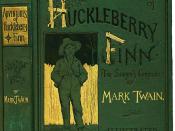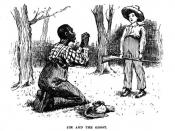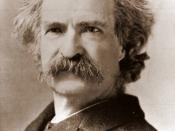In Adventures of Huckleberry Finn by Mark Twain, Huck, the main character, attempts to establish his identity. Huck explores many identities that appeal to him throughout the story, such as a religious and "sivilized" life with the Widow Douglas, a violent and irrational life with the Grangerfords, and a dishonest and imposturous life with the Duke and King. However, by assimilating to others, Huck essentially neglects his true morals, beliefs, and virtues. Furthermore, Huck's ambiguity causes him to blindly conform to those who surround him. In Adventures of Huckleberry Finn, Huck pursues an authentic identity which is to live an uncivilized, nonviolent, rational, and moral life. Indeed, Mark Twain utilizes Huck's personal morals to criticize the South on the issues of slavery, violence, and honesty.
Although Huck is seemingly content under the civilized Widow Douglas, he still possesses a natural desire to be free. When Pap takes him to live by the river Huck notes that "it [is] kind of lazy and jolly, laying off comfortable all day, smoking and fishing, and no books nor study, [...]
and I didn't see how I'd ever got to like it so well at the widow's, where you had to wash, and eat on a plate" (Twain, 1279). The uncertainty of Huck's identity is apparent from his conflicting relationships with both the Widow Douglas and Pap. While under the Widow's rule, Huck values discipline and order, however, when living with Pap he values idleness and laziness. In addition, Huck try's to accommodate to those who surround him by assimilating to their ways. Pap informs Huck that he might have to return to the Widow and Huck is appalled. Huck thinks to himself, "this shook me up considerable, because I didn't want to go back to the widow's any more and...


